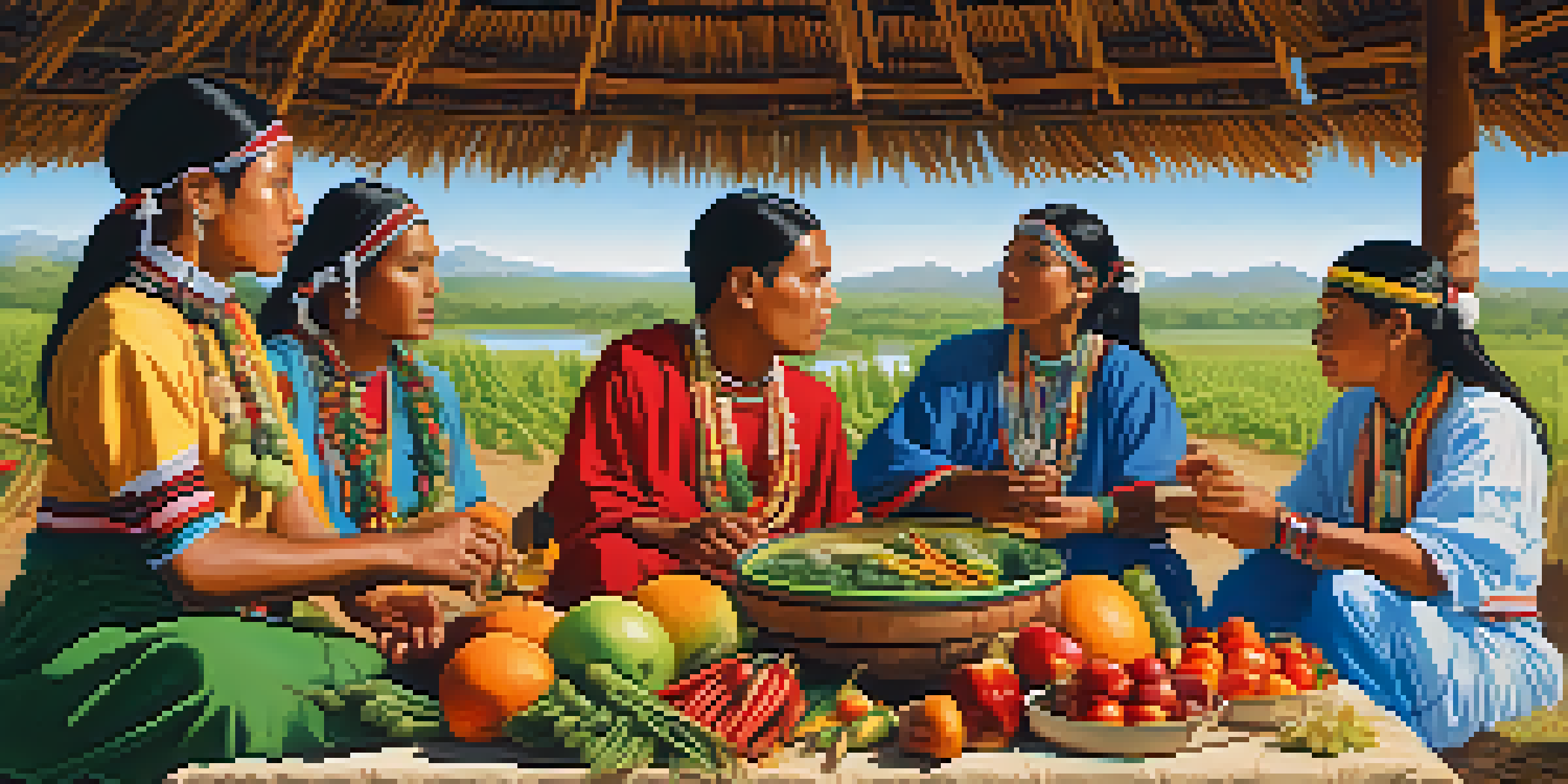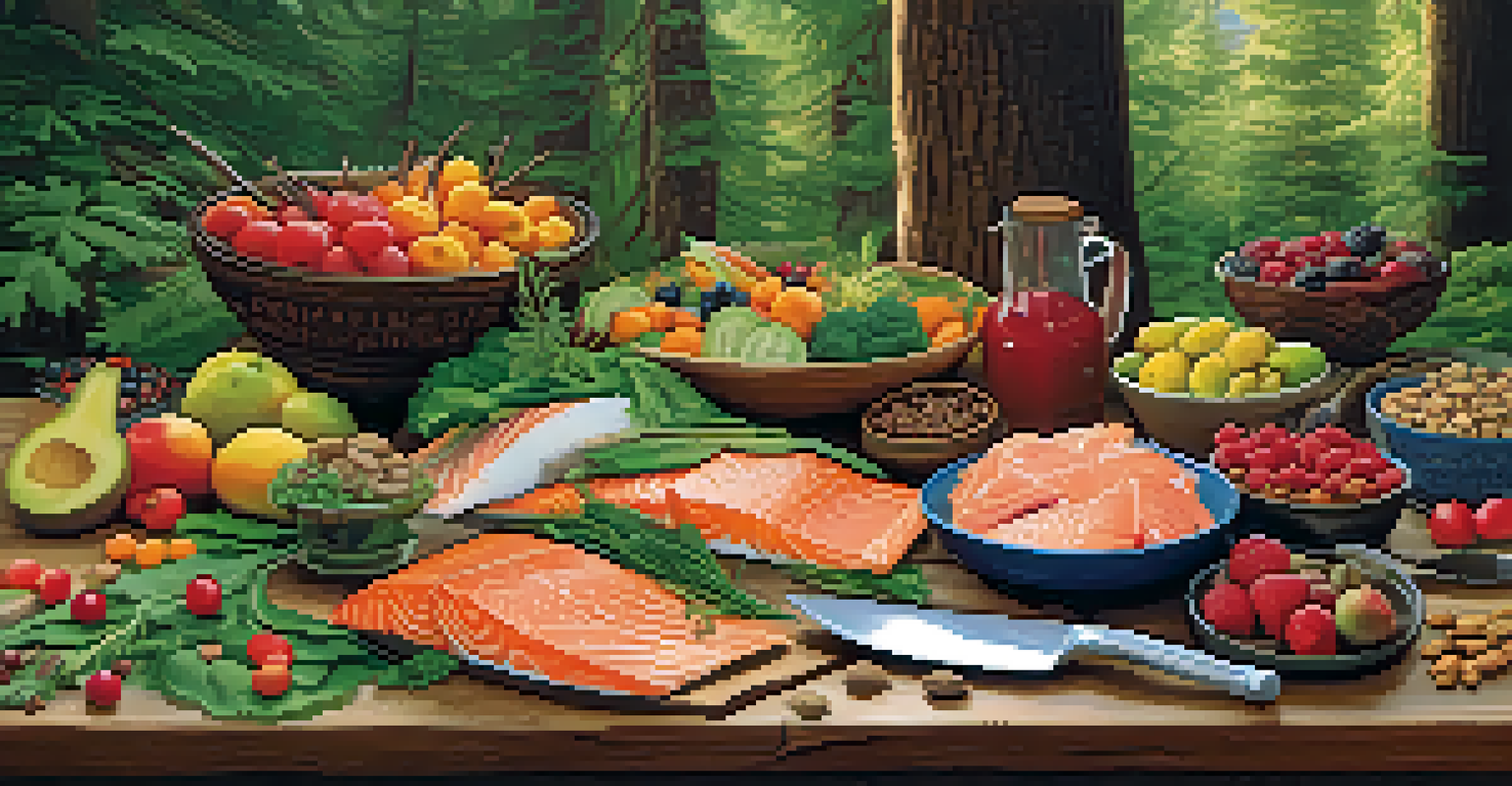Indigenous Cultures and Their Unique Raw Food Practices

Understanding Indigenous Cultures and Their Rich Heritage
Indigenous cultures are incredibly diverse, each with its own unique traditions, languages, and beliefs. These cultures have thrived for thousands of years, often in harmony with their natural surroundings. Their rich heritage is reflected in their culinary practices, which often emphasize the use of raw, unprocessed ingredients. By understanding their history, we can appreciate the depth and significance of their food practices.
Food is our common ground, a universal experience.
Many Indigenous peoples view food as more than just sustenance; it is a vital part of their identity and a connection to their ancestors. For instance, the traditional practices of hunting, gathering, and fishing are not only about food but also about maintaining cultural values and community bonds. This perspective fosters a deep respect for the land and its resources, emphasizing sustainability and balance.
Raw food practices within Indigenous cultures often involve seasonal and local ingredients, highlighting a profound relationship with nature. By consuming foods in their natural state, these communities preserve not only the nutritional integrity of their meals but also their cultural significance. This connection to the earth and its cycles is a cornerstone of Indigenous life.
The Importance of Local Ingredients in Raw Food Diets
Local ingredients play a crucial role in Indigenous raw food practices, as they are often the foundation of traditional diets. Communities rely on what the land provides, whether it’s fruits, nuts, seeds, or vegetables. The choice to eat local not only ensures freshness but also strengthens the connection to one's homeland, celebrating the unique flavors and offerings of the region.

For example, the Inuit people consume raw fish like salmon, which is abundant in their Arctic environment. This practice not only provides essential nutrients but also reflects their deep understanding of seasonal availability. Similarly, Indigenous cultures in tropical regions may include a variety of fruits and nuts that are locally sourced, promoting biodiversity and sustainability.
Cultural Ties Through Food Practices
Indigenous raw food practices are deeply intertwined with cultural identity, serving as a means of connecting with heritage and community.
By prioritizing local ingredients, Indigenous cultures demonstrate a model of ecological eating that many modern diets strive to achieve. This approach minimizes environmental impact and supports food sovereignty, allowing communities to maintain control over their food sources. Such practices remind us of the importance of knowing where our food comes from.
Raw Food Practices: Health Benefits and Nutritional Value
Raw food practices among Indigenous cultures are not just about tradition; they also offer significant health benefits. Consuming raw foods maintains higher levels of vitamins, enzymes, and nutrients that can be lost through cooking. This focus on fresh, minimally processed food contributes to the overall well-being and vitality of these communities.
Eating is a political act.
For instance, many Indigenous diets are rich in antioxidants, which help combat oxidative stress in the body. Foods like berries, nuts, and leafy greens are staples in many cultures and provide essential nutrients that support immune function and overall health. These raw ingredients are often packed with fiber, promoting digestive health and preventing chronic diseases.
Moreover, the emphasis on natural, whole foods aligns with modern nutrition principles that advocate for a balanced diet. By incorporating a variety of raw foods, Indigenous cultures exemplify how traditional eating patterns can promote longevity and wellness. This holistic approach to food and health is a valuable lesson for us all.
Cultural Significance of Raw Food Practices
Raw food practices are deeply intertwined with the cultural identities of Indigenous peoples. Food is often central to ceremonial gatherings, celebrations, and rituals, serving as a means of connecting with heritage and community. Traditional dishes, prepared with raw ingredients, carry stories and meanings that transcend generations.
For example, many Indigenous cultures have specific rituals associated with food preparation and consumption, emphasizing respect for the ingredients and the environment. These practices not only reinforce cultural values but also educate younger generations about their heritage and the importance of sustainability. Sharing meals becomes an act of storytelling and cultural preservation.
Sustainability in Food Sourcing
Indigenous cultures prioritize sustainability by foraging and hunting in harmony with nature, ensuring resources are preserved for future generations.
Through these culinary traditions, Indigenous peoples celebrate their identity and foster a sense of belonging. The practice of eating raw foods often symbolizes a return to ancestral ways, reinforcing the importance of maintaining cultural ties in a rapidly changing world. This connection to food as a cultural expression is a powerful aspect of Indigenous life.
Sustainable Practices in Indigenous Raw Food Diets
Sustainability is a fundamental principle in Indigenous raw food practices. These communities have long understood the importance of living in harmony with nature, which is reflected in their food sources. By foraging, fishing, and hunting sustainably, they ensure that resources are available for future generations.
For instance, many Indigenous cultures have developed techniques for preserving food without cooking, such as drying, fermenting, or using natural refrigeration methods. These techniques not only reduce waste but also extend the shelf life of seasonal ingredients, allowing communities to thrive year-round. This sustainable approach demonstrates a profound respect for the land and its capacity to provide.
Incorporating these sustainable practices into modern diets can teach us valuable lessons about resource management and environmental stewardship. By adopting similar philosophies, we can work towards a more sustainable food system that honors the wisdom of Indigenous cultures. This connection between food, sustainability, and culture is increasingly relevant in today’s world.
Modern Challenges Faced by Indigenous Raw Food Practices
Despite the resilience of Indigenous cultures, many face challenges in maintaining their traditional raw food practices. Factors such as climate change, urbanization, and loss of land threaten the availability of local ingredients and the transmission of cultural knowledge. These challenges can undermine the health and well-being of Indigenous communities.
Moreover, globalization has introduced processed foods that often replace traditional diets, leading to health issues such as obesity and diabetes. The shift away from raw, whole foods can have detrimental effects on nutrition and cultural identity. As younger generations become more disconnected from traditional practices, the risk of losing this valuable knowledge increases.
Challenges to Traditional Practices
Modern issues like climate change and globalization threaten the preservation of traditional raw food practices among Indigenous peoples.
Addressing these challenges requires a concerted effort to support Indigenous food sovereignty and promote the importance of traditional diets. Collaboration with Indigenous communities can help revive and sustain raw food practices, ensuring that these rich cultural traditions continue to thrive in a modern context. This is not just about food; it’s about preserving heritage and identity.
Celebrating Indigenous Raw Food Practices Today
Today, there is a growing recognition of the value of Indigenous raw food practices, both for health and cultural preservation. Initiatives aimed at revitalizing traditional diets are gaining momentum, as communities seek to reconnect with their food sources and heritage. This resurgence is a testament to the resilience and adaptability of Indigenous cultures.
Food festivals, workshops, and educational programs are emerging, highlighting the importance of Indigenous culinary traditions. These events offer opportunities for sharing knowledge and fostering appreciation for raw food practices. They serve as platforms for Indigenous voices, allowing communities to showcase their unique culinary heritage and its relevance in contemporary society.

By embracing and celebrating these practices, we not only honor Indigenous cultures but also enrich our own understanding of food and its significance. Learning about and participating in Indigenous raw food practices can inspire a more mindful approach to eating, one that values health, sustainability, and community. Ultimately, this celebration is a step toward acknowledging and respecting the wisdom of Indigenous peoples.